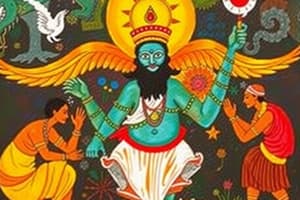Podcast
Questions and Answers
A ______ is a belief not based on reason, representing an irrational fear of the unknown or the mysterious.
A ______ is a belief not based on reason, representing an irrational fear of the unknown or the mysterious.
superstition
The itching of the palm, the cawing of a crow, and the hooting of an owl are examples of ______ believed by some.
The itching of the palm, the cawing of a crow, and the hooting of an owl are examples of ______ believed by some.
superstitions
Belief in superstitions can prevent us from thinking freely, create fear, destroy our ______, and make us feel trapped.
Belief in superstitions can prevent us from thinking freely, create fear, destroy our ______, and make us feel trapped.
self-confidence
Superstitions often arise when rare occurrences or chance happenings are ______ into widespread beliefs.
Superstitions often arise when rare occurrences or chance happenings are ______ into widespread beliefs.
Practices such as using caged parrots or decorated cows to predict the future are examples of ______ practices.
Practices such as using caged parrots or decorated cows to predict the future are examples of ______ practices.
The persistence of superstitious beliefs in the 21st century, even among ______ people, is a concerning issue.
The persistence of superstitious beliefs in the 21st century, even among ______ people, is a concerning issue.
Overcoming irrational beliefs and unscientific practices is essential for societal ______.
Overcoming irrational beliefs and unscientific practices is essential for societal ______.
Many superstitious practices have been passed down through ______, leading to blind belief and a lack of questioning.
Many superstitious practices have been passed down through ______, leading to blind belief and a lack of questioning.
Flashcards
Superstition
Superstition
A belief or practice resulting from ignorance, fear of the unknown, or trust in magic or chance.
Irrational Fear
Irrational Fear
The irrational fear of the 'unknown' or 'mysterious' that gives rise to superstitious beliefs and practices.
Itchy Palm Superstition
Itchy Palm Superstition
A belief that the itching of the palm indicates the inflow of money.
Crow Cawing Superstition
Crow Cawing Superstition
Signup and view all the flashcards
Owl Hooting Superstition
Owl Hooting Superstition
Signup and view all the flashcards
Black Cat Superstition
Black Cat Superstition
Signup and view all the flashcards
Blind Belief
Blind Belief
Signup and view all the flashcards
Drawbacks of Superstition
Drawbacks of Superstition
Signup and view all the flashcards
Study Notes
Superstition Defined
- Superstition is a belief that is not based on reason.
- It is an irrational fear of the unknown or mysterious.
Superstition in India
- India is considered a land of many religions.
- These religions have led to the spread of superstition through various practices passed down through tradition.
- People follow these practices due to blind belief, without questioning or studying them.
- India is called the land of superstitions, having more superstitious practices than any other country.
Examples of Superstition in India
- Itching of the palm indicates the inflow of money.
- The cawing of a crow signifies the arrival of guests.
- The hooting of an owl is a signal of sickness.
- The wail of a dog indicates death.
- A black cat crossing one's path means failure.
- A drizzle at a wedding is a good omen.
- Certain days are believed good for starting ventures, while others bring doom.
- The number seven is considered lucky, while thirteen is unlucky.
Origins of superstitious beliefs
- Based on rare occurrences or chance happenings, without logic.
- These occurrences were generalized, and beliefs developed around them.
- The actual truth behind these beliefs has not been tested or verified.
Drawbacks of Superstition
- Prevents free thinking.
- Fosters fear.
- Destroys self-confidence.
- Makes people slaves.
Superstitious Practices
- Using a caged parrot to pick a card containing a person's future.
- People go around with a decorated cow or bull that is believed to foretell a person's success or failure.
- These practices are prevalent throughout India.
- Innocent children are sacrificed to propitiate spirits in some parts of the country.
- Human beings are suspended on hooks and taken out in processions as a religious practice in certain areas.
- Scourging and starving people in the belief that it will chase the demon
Combating Superstition
- Educated people and future leaders should fight against superstitious beliefs.
- Raise voice against superstitions and use reasoning to prove them to be myths.
- Trust in God and not fear superstitious practices.
- All days and numbers are equally good or bad.
- A cat crossing the path, a crow cawing, an owl hooting, or a dog wailing should not deter one from pursuing their goals.
Studying That Suits You
Use AI to generate personalized quizzes and flashcards to suit your learning preferences.




